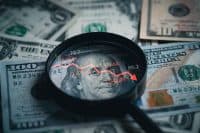 Americans have begun to lose confidence in the economy again. Gallup data shows the figure is back to the level of March 2009 — three months before the last recession ended.
Americans have begun to lose confidence in the economy again. Gallup data shows the figure is back to the level of March 2009 — three months before the last recession ended.
The federal government may say that the economy is still in a growth phase. Clearly, many Americans disagree. They have reason to. Americans have watched the jobless rate begin to climb again. Nearly a third of U.S. citizens without jobs have been looking for one for over a year. Home prices still move lower, based on both government and private data. Recent consumer confidence data has been bad.
Gallup reports that “Americans’ economic confidence plunged last week to its lowest weekly level since March 2009. Gallup’s Economic Confidence Index fell to -41 in the week ending July 17 — down from -34 the prior week and -31 during the same week a year ago.”
The effects of confidence may be hard to measure, at least in definite terms. It can be assumed, though, that as confidence erodes it creates a harsh cycle for the economy. A drop in confidence leads to caution and a erosion of consumer activity. That, in turn, hurts retail sales. Retailers and their suppliers find margins tighten, which often causes more layoffs. The number of people fired over the last month has already increased, according to news reports.
Obama’s stimulus package and the Federal Reserve’s QE2 program have ended. Whatever boost they provided to economic activity is over. Government austerity activity at all levels has already begun to prune employment ranks in the public sector. The compromise on a national budget, which will allow an increase in the debt ceiling, will mean more federal government jobs will be lost. Another economic tailspin has begun and there are none of the traditional government-supplied safety nets to stop it.
Methodology of the Gallup poll: Results are based on telephone interviews conducted on a weekly basis in 2011 to the week ending July 17. For the week ending July 17, 2011, on the Gallup Daily tracking survey, interviews were conducted with a random sample of 3,489 adults, aged 18 and older, living in all 50 U.S. states and the District of Columbia.
Douglas A. McIntyre Let us know what you think of this article [email protected]
Are You Still Paying With a Debit Card?
The average American spends $17,274 on debit cards a year, and it’s a HUGE mistake. First, debit cards don’t have the same fraud protections as credit cards. Once your money is gone, it’s gone. But more importantly you can actually get something back from this spending every time you swipe.
Issuers are handing out wild bonuses right now. With some you can earn up to 5% back on every purchase. That’s like getting a 5% discount on everything you buy!
Our top pick is kind of hard to imagine. Not only does it pay up to 5% back, it also includes a $200 cash back reward in the first six months, a 0% intro APR, and…. $0 annual fee. It’s quite literally free money for any one that uses a card regularly. Click here to learn more!
Flywheel Publishing has partnered with CardRatings to provide coverage of credit card products. Flywheel Publishing and CardRatings may receive a commission from card issuers.
Thank you for reading! Have some feedback for us?
Contact the 24/7 Wall St. editorial team.





